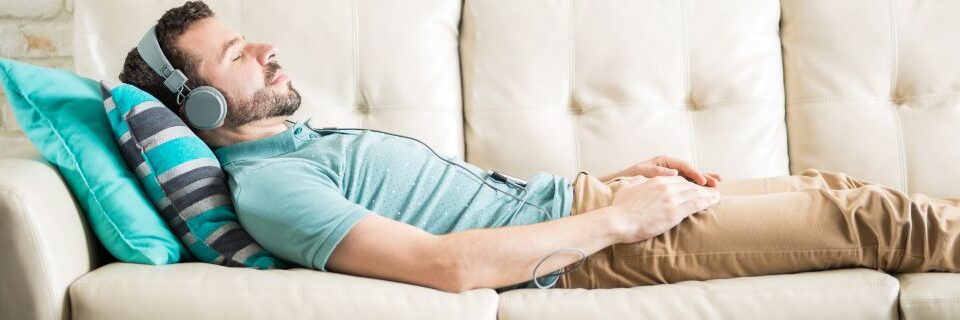
How a Weight Loss Hypnosis App Can Help You Lose Weight for Good

The Top 5 Developments in Mental Health for 2021
Table of Contents
If you have ever had a sleepless night or two, you probably already know how important sleep is to your mental well-being and day-to-day functioning. When you sleep, you are not simply spending your time unconscious. Your body and brain are actively working to repair your body and regulate internal processes.
From the moment you fall asleep, you begin to cycle through REM and non-REM sleep stages. These cycles are further broken into light and deep sleep stages. Both REM and non-REM sleep are essential for restoration and good health. Sleep is largely regulated by natural circadian rhythms controlled by the brain’s biological clock and sleep drive, which causes us to crave or desire sleep in much the same way we hunger for food.
When you do not get enough sleep, you might not notice the effects right away, but your body does. Your brain’s plasticity struggles and is less able to adapt. Inadequate or poor-quality sleep can leave you struggling to process new material and recall it at a later date. Your body may struggle, too, with an increased risk of depression, low immunity, metabolic disorders, and high blood pressure. Hypnosis for sleep can help you get the sleep you need for good health.
What Is Interfering with Your Sleep?
If you cannot get to sleep, stay asleep, or wake too early, you might have insomnia. Insomnia is a common problem that can interfere with your sleeping patterns, undermine your quality of life, and affect your ability to function. Short-term insomnia affects many people as a result of stress or traumatic events but will typically resolve on its own. However, for some people, insomnia can become chronic. In this case, insomnia is associated with other factors or health issues. With hypnosis for sleep anxiety, you can work on the issues underlying your insomnia and focus on getting the restorative sleep you need.
Determining what is causing your insomnia can help you better manage it. Common underlying causes of insomnia can include:
- Stress and stressful events
- Shift work and jet lag
- Poor sleep or diet habits
- Health issues, such as anxiety or depression
- Certain medications, including antidepressants and blood pressure medications
- Sleep apnea
- Certain substances, including nicotine, caffeine, and alcohol
Age is also associated with insomnia. While aging alone does not necessarily interfere with the ability to get a good night’s sleep, it does increase the risk of developing health problems or using medications that can affect your sleep. UpNow’s sleep hypnosis app promotes healthy sleep habits while gently guiding you towards deep mental and physical relaxation. With hypnosis for sleep anxiety, you can shed the worries of the day and sink into a healing, restful sleep each night.

Improving Sleep with Hypnosis for Deep Sleep and Relaxation
When you are struggling to get the sleep you need, you might find yourself in a wakeful cycle that you cannot escape. You worry about falling asleep, which keeps you awake. You then spend your night awake, mulling over the fact that you are not getting the sleep you need. The next night, you feel even more stressed and less likely to fall asleep easily.
It is time to end the cycle with hypnosis for sleep anxiety. Using hypnosis for sleep can help you take a deep, relaxing breath as you set those worries aside. You can calm and quiet your mind as you separate the stress and anxiety of the day from the tossing and turning of the night. You will learn to relax your body and calm your mind using a variety of techniques through hypnosis for deep sleep and relaxation.
Hypnosis is naturally relaxing and can help you fall asleep faster, but evidence shows that it does more than that. A study from the Universities of Zurich and Fribourg demonstrated that using hypnosis for sleep can also improve the quality of the sleep you get. The study, which involved 70 healthy women, revealed that hypnosis could increase slow-wave sleep by as much as 80 percent. Women who used hypnosis audios fell asleep faster and enjoyed a higher quality of sleep than women who did not use hypnosis.
If you are struggling to fall asleep, stay asleep, or get the restorative sleep you need, hypnosis might be just the solution you need. Visit UpNow.com today to learn more about using hypnosis for deep sleep and relaxation or to download our sleep
UpNow Health only uses high-quality sources, including peer-reviewed articles, to support the facts within our articles. All our articles are reviewed by experts to ensure that our content is accurate, helpful, and trustworthy.
1. The Science of Sleep: Understanding What Happens When You Sleep. John Hopkins Medicine. https://www.hopkinsmedicine.org/health/wellness-and-prevention/the-science-of-sleep-understanding-what-happens-when-you-sleep
2. Hayley, A. C., Williams, L. J., Venugopal, K., Kennedy, G. A., Berk, M., & Pasco, J. A. (2015). The relationships between insomnia, sleep apnoea and depression: findings from the American National Health and Nutrition Examination Survey, 2005-2008. The Australian and New Zealand journal of psychiatry, 49(2), 156–170. https://doi.org/10.1177/0004867414546700
3. How much sleep do I need? Centers for Disease Control and Prevention. https://www.cdc.gov/sleep/about_sleep/how_much_sleep.html
4. Markwald, R. R., Melanson, E. L., Smith, M. R., Higgins, J., Perreault, L., Eckel, R. H., & Wright, K. P., Jr (2013). Impact of insufficient sleep on total daily energy expenditure, food intake, and weight gain. Proceedings of the National Academy of Sciences of the United States of America, 110(14), 5695–5700. https://doi.org/10.1073/pnas.1216951110
5. Ng, B. Y., & Lee, T. S. (2008). Hypnotherapy for sleep disorders. Annals of the Academy of Medicine, Singapore, 37(8), 683–688.
6. University of Zurich. (2014, June 2). Hypnosis extends restorative slow-wave sleep, research shows. ScienceDaily. Retrieved December 15, 2021 from www.sciencedaily.com/releases/2014/06/140602101207.htm
7. Chamine, I., Atchley, R., & Oken, B. S. (2018). Hypnosis Intervention Effects on Sleep Outcomes: A Systematic Review. Journal of clinical sleep medicine : JCSM : official publication of the American Academy of Sleep Medicine, 14(2), 271–283. https://doi.org/10.5664/jcsm.6952
8. What is insomnia? National Heart, Lung, and Blood Institute. https://www.nhlbi.nih.gov/health/health-topics/topics/inso#. Accessed Dec. 7, 2021.
9. Sleep disorders: The connection between sleep and mental health. National Alliance on Mental Health. http://www.nami.org/Learn-More/Mental-Health-Conditions/Related-Conditions/Sleep-Disorders. Accessed Dec. 7, 2021.
10. Insomnia. Mayo Clinic. https://www.mayoclinic.org/diseases-conditions/insomnia/symptoms-causes/syc-20355167. Accessed Dec. 7, 2021.











